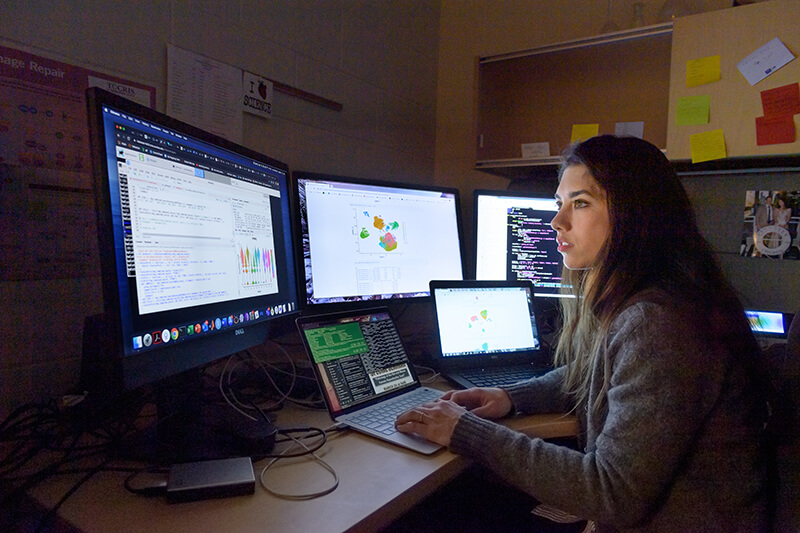
The next generation of treatments for cancer may be found, not by scientists peering through microscopes, but by computer scientists crunching numbers. Thanks to unprecedented amounts of data, Purdue University researchers across multiple disciplines, including comparative pathobiology, are using innovative data science techniques to better understand the genetics and cellular biology of cancer cells and tumors allowing them to pioneer new diagnostic tools, generate novel therapeutic treatments, and significantly advance the fight against cancer. Some of these advances may even allow oncologists to harness a patient’s own immune system to fight off cancer.
Among the researchers involved in this work is Dr. Nadia Lanman, who holds an appointment as research assistant professor in the College of Veterinary Medicine’s Department of Comparative Pathobiology. She uses Purdue’s network of supercomputers to enable machine-learning projects that help sort and analyze data.
Previously, scientists had to rely on small sample sizes, case studies and, in some lucky cases, genetic or DNA analyses of tumors. Now, they can draw from enormous publicly available databases that include an almost mind-numbing amount of data: information on people with different types of cancer across an enormous spectrum of continents, races, cultures, genders and age, as well as the genetics of hundreds of thousands of individual cells that make up tumors and other tissues. There is so much data, in fact, that traditional analytical tools fail.
That is where data science comes in.
Data science is a field of science that uses advanced computer modeling and mathematics to analyze complex sets of data: data sets that are enormous and even those that include different kinds of data. It allows scientists to better understand problems and to find paths through the chaos.
Finding the right treatment at the right time is at the heart of what Purdue’s Center for Cancer Research does. For the researchers, like Dr. Lanman, it is what drives them, what inspires the lab work, and what keeps scientists at their supercomputers and their lab benches, and what keeps them working together and learning from each other.
Dr. Lanman is helping scientists analyze data in new ways, giving them insights into the data and better pathways forward. “When someone comes in with cancer, we don’t know how they’re going to respond to different types of treatment, and we don’t know how sick they’re going to get from potential side effects,” Dr. Lanman said. “If we can tease these things out using machine learning and these massive data sets, we could imagine a world where, when a cancer patient comes in, we could collect data and use data science to help oncologists make recommendations.”
Dr. Lanman reiterated her mission and the mission of the cancer center: to make discoveries that will build the foundation for innovative cancer solutions. The cure for cancer is not in one field or the other; it is in experts from all fields working together using the most up-to-date data and analytical techniques.
“I love the work I do — that we do — at the cancer center,” Dr. Lanman said. “I love that we are really trying, every day, to make the world a better place for patients.”
Other scholars involved in this kind of research include Dr. Andrew Mesecar, Purdue’s Walther Professor in Cancer Structural Biology, who is deputy director of the Purdue University Center for Cancer Research (PCCR); Dr. Min Zhang, a statistics professor and associate director of data science at PCCR; and Dr. Majid Kazemian, an assistant professor of biochemistry and computer science. Click here to read a complete story that includes details about these researchers using data to combat cancer.
